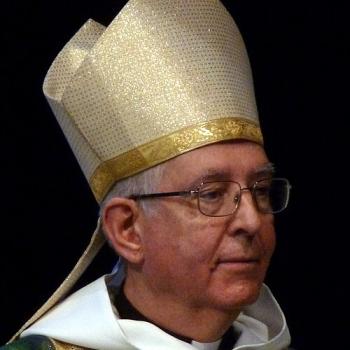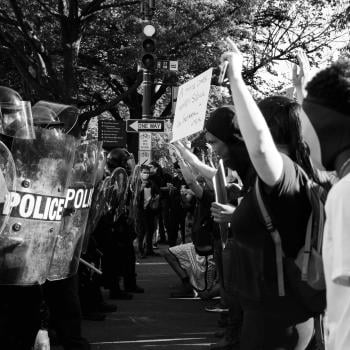Amer adds that observational comedy provides an opportunity to talk about a diverse society because, "If you can make them laugh, they will listen to whatever you have to tell them; you can sneak in the message." Therefore, other minorities, who don't necessarily ascribe to the Islamic faith, may identify with the Muslim experience of being a minority.
Cheshire Cat Smiles
Merging imagination with reality situations calls on talent; to create a joke is the work of genius. The comic combines the funny and not-so-funny moments to complete the narrative, but manages to evoke the Cheshire cat smile within the "Alice"-like audience because the punch line often challenges the logic of Wonderland, or our tragicomedy world. As Azhar Usman related:
It's no coincidence that even ancient Greeks grouped comedy and tragedy when telling stories—look at the twin emblem of the Greeks showing a laughing face next to the sad face.
Comedy looks at the comedy and tragedy behind common situations experienced by many Muslim-Americans. For example the "marriage talk" within families constantly blurs the line between private and public if one relates to the larger extended families; there's enough material for both comics and sociologists!
Vocalizing the Challenge: Literally and Metaphorically
Like the two sides of storytelling, there are two sides to the comedy craft. Mohamad Mohamad writes and sings his comedy; visit Youtube to hear his original song "I'll Share My Chickpeas With You," which pokes fun at the love of common food and humanity. Honing comedic talent operates on various levels: from performing onstage to writing. Mo'Na summarized the differences between standup and writing:
[Standup] is like a mini-play or monologue; you must set up the situation and the punch line with examples. Then you have to say it over and over again until you work out the kinks till it's perfect, whereas with comedy writing, it is contextualizing what's funny.
Essentially, the comic has to get comfortable with her own voice, both literally and metaphorically. The efforts to amplify the comedic include many examples. Preacher Moss wrote jokes for George Lopez before taking the stage full-time. Jameeleh gained a great internship experience writing for the Conan O'Brien Show, worked for the The Colbert Report in New York, and served as Associate Producer for Cedric's Urban Circus with Cedric The Entertainer. Similarly, Mo'Na continued her college interest of comedy and performance by taking improvisational classes at Chicago's Second City.
I noted the trend of Muslim-American comics of Palestinian descent above. The talent pool represented by Mo'Na, Jameeleh Shelo, and Maysoon Zayid parallels comedy's characteristic trait of highlighting challenges with a punch of humor. According to Jameeleh Shelo, Muslim-American female comics face challenges in the profession, just like any other profession, but they support each other. For example, Maysoon Zayid inspired Jameeleh's early comedy career when she was a writer in New York.
Perhaps it is no coincidence that comedy resonates strongly among these three young Palestinian-American women because comedy challenges censorship and offers a platform for some of the most creative geniuses and active voices from minority communities. Minority status concerns are not just a facet of religion and identity; they are also a facet of smart comedy that activates a powerful voice.
Juha Is Back, but Peeling Onions!
Muslim-American comics laugh at themselves and our world around us. Said Durrah offered some advice to rising Muslim-American comics: "be more social and more likable" because Muslim-Americans who keep to themselves miss an opportunity to engage. As a comedian, he optimizes his standup routine by identifying as Muslim and Palestinian. For Durrah, an intangible measure of success is when he attends a business party and is proudly introduced by his friends as an Arab-Muslim. "That's what will change people's perceptions. Everybody has to like someone before they trust them," Durrah concluded.
Muslim-American comics remind us that there's a Juha in all of us. I would argue that Charlie Brown may be the contemporary American version of Juha. However, Muslim-American comedians present new images of the storyteller, the joker, and the satirist. Hopefully, The Onion will invite one of these talented Muslim-American comedians and writers to contribute. God willing, Muslim-American comedians will peel the onion layers, resulting in tears of laughter.
For current and upcoming performances, visit these links:
- Mo ‘Na
http://arab-issh.com/ - Khaled the Comic
http://arab-issh.com/ - Preacher Moss
http://www.youtube.com/watch?v=WDKZ5CvwA-w - Azhar Usman
http://www.youtube.com/watch?v=k5W6CoDKpYI&feature=mfu_in_order&list=UL - Mohamed Amer
http://www.youtube.com/watch?v=gQVz7vafqJw&feature=related - Dean Obeidallah
http://www.youtube.com/watch?v=uzRqEzhy4So - Amer Zahr
http://www.amerzahr.com/ - Mohamed Mohamed
http://www.reverbnation.com/mohamedmohamed - Jameelah Shelo
http://www.linkedin.com/pub/jameeleh-shelo/23/611/890




